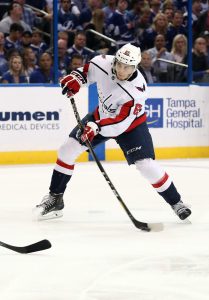The NHL has already announced the initial ten-man All-Star rosters for each of the four divisions, but new this year is an additional fan ballot to add an eleventh and final member to each squad. The “Last Man In” ballot, an idea invented by Major League Baseball, pits one skater from each team in each division against one another for a chance to participate in All-Star festivities. Fans will decide, with online voting opening tomorrow and lasting until midnight ET on January 10, which of the following players will get the final nod:
Pacific Division
F Leon Draisaitl (EDM)
F Logan Couture (SJS)
F Anze Kopitar (LAK)
F Ryan Getzlaf (ANA)
F Brock Boeser (VAN)
F Jonathan Marchessault (VGK)
D Mark Giordano (CGY)
D Oliver Ekman-Larsson (ARI)
Central Division
F Gabriel Landeskog (COL)
F Zach Parise (MIN)
F Patrik Laine (WPG)
F Tyler Seguin (DAL)
F Vladimir Tarasenko (STL)
F Filip Forsberg (NSH)
F Jonathan Toews (CHI)
Atlantic Division
F Brayden Point (TBL)
F Jeff Skinner (BUF)
F Dylan Larkin (DET)
F Aleksander Barkov (FLA)
F Patrice Bergeron (BOS)
F Mark Stone (OTT)
D Morgan Rielly (TOR)
D Shea Weber (MTL)
Metropolitan Division
F Nicklas Backstrom (WSH)
F Kyle Palmieri (NJD)
F Anders Lee (NYI)
F Jakub Voracek (PHI)
F Teuvo Teravainen (CAR)
F Nick Foligno (CLB)
F Mats Zuccarello (NYR)
D Kris Letang (PIT)
Due to the limits on selections by team, both in the initial rosters and the “Last Man In” vote, there are several star players who cannot be saved by fan voting this year. The Toronto Maple Leafs’ Mitch Marner, the No. 6-ranked scorer in the league, highlights the snub group, which also includes Calgary Flames forwards Sean Monahan and Matthew Tkachuk, Pittsburgh Penguins forwards Evgeni Malkin and Phil Kessel, and Minnesota Wild defenseman Ryan Suter. Other odd omissions, not necessarily forced by the format, are Columbus’ Artemi Panarin, Nashville’s Ryan Johansen, and Montreal’s Max Domi and Jeff Petry. However, the new final vote option does largely do a good job of giving each team and their fan base one last chance to get a deserving player into the All-Star game.

